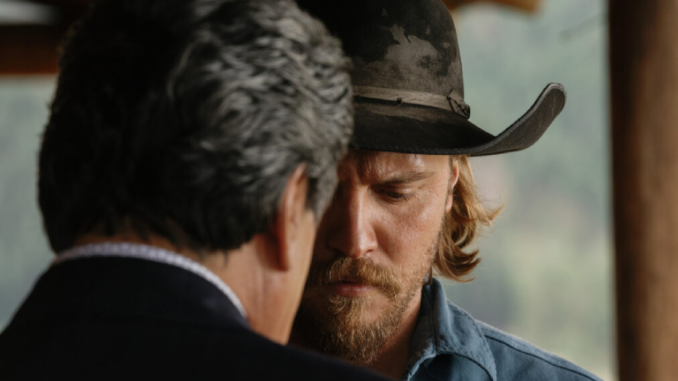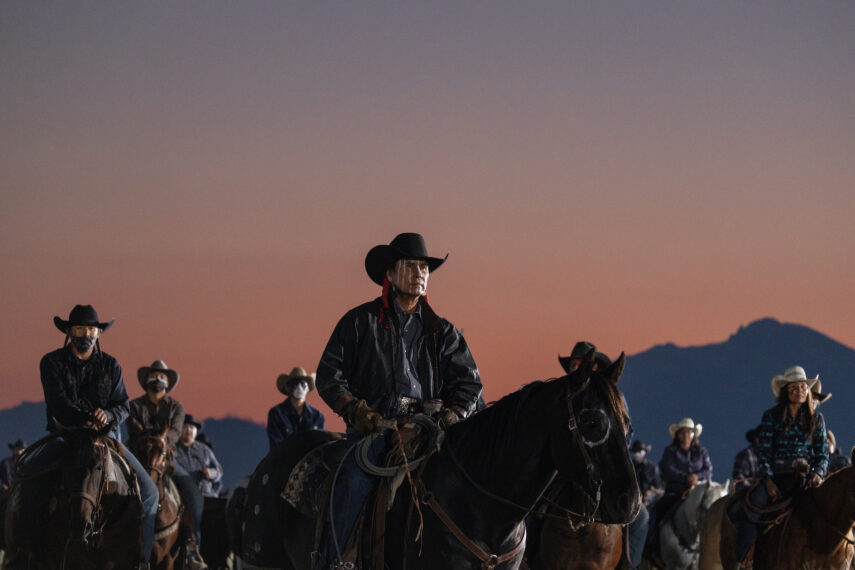
Yellowstone‘s fate was always sealed, according to executive producer and director Christina Voros. John Dutton’s (Kevin Costner) death was always going to be part of the final season whether Costner was involved or not, she says, but it’s the “how” that had to be tweaked after Costner’s shocking early departure. The selling of the Yellowstone Dutton ranch to a trusted ally, Thomas Rainwater (Gil Birmingham), was also always part of the plan. As Voros explains it to TV Insider in a series finale interview, Taylor Sheridan‘s vision for the end of the Dutton ranch’s story has always been clear throughout Yellowstone‘s run before 1883 and 1923 were added into the equation.
Voros has been with Yellowstone since the beginning and directed 12 episodes total, including the first four episodes of the final season. Here, she breaks down the Yellowstone series finale with TV Insider.
This was a huge season of change for Yellowstone with Kevin Costner‘s exit. Was the end of this season always planned even before the John Dutton was written off?
Christina Voros: The “what” of the end of the season was always planned. The “how” may have needed to be adjusted. Taylor has always known what the ending of this legacy was. I don’t know how Kevin’s departure shifted or truncated that, you would have to talk to Taylor about the specifics there. But I know that Taylor always saw where this was going. It’s clear from the way that — if you really study 1883 and 1923 — there are clues about the generational legacy and the destiny of the land. If you really want to get in there with your magnifying glass, you could find clear proof that this is not a casual conclusion. This is something that was always part of a bigger arc of telling the story of the legacy of the Dutton family.
I was going to ask if that 1883 prophecy came first and then was worked into Yellowstone, but it seems like what you’re saying is [giving the land back to the indigenous people] was always the plan.
I think it always dovetailed together. Yellowstone was the first story, but 1883 came long before the final season of Yellowstone. So I think the shape of the saga was always there. It was a question of how we get to the ending.

Paramount Network
I can’t recall ever seeing an American TV show that had a plot line about giving land back to Native American people, which I think is powerful. Tell me about that ending and the significance of it. I thought that was a beautiful choice.
It was always the original choice. That was part of what had been known in Taylor’s mind from the very beginning. It’s very interesting. Yellowstone is one of those shows that’s touched a lot of people, and it has a fan base that crosses all these different political, generational lines of thought. There are a lot of East Coast liberals who think Yellowstone is a red-state show, and there are a lot of red-state viewers who think that it goes into liberal [politics]. Everyone has a different lens on what the show is supposed to be to them. I think that’s part of the strength of Taylor’s writing. People can see themselves in the story and based on how nuanced these characters are and all these different walks of life that are exhibited through the storytelling, people see in it what they want to see in it.
It was interesting watching, this being the final finale, as people were responding and some people were thrilled and some people were devastated. If you’ve created enough of a sense of ownership of the story by the audience itself, it means you’ve created something that they’re invested in or that they see themselves in or they care enough about to see more of. I think if you have managed to succeed at doing that, you have served your purpose as a storyteller. And so in many ways, the fact that the response to the season has been so varied and so strong from all of these different perspectives, I think speaks to the success of the show and the success that Taylor has in writing characters that people feel intimately connected to and care about.
How do you decide what the final shot, the final scene of a show that, as you said, has been so beloved for so long will be?
Taylor directed the final episode, and Taylor did the final cut of the final episode of a show that he started seven years ago, and that all came pouring out of his brain. So it was a true act of auteur, directing, writing, storytelling. That last moment was what Taylor felt in his heart was the right way to conclude a story that he’s poured so much of himself into over the years.
What was your reaction to the fact that Rip [Cole Hauser] doesn’t find out what Jamie [Wes Bentley] did to Beth [Kelly Reilly] before Jamie dies? [Beth got pregnant with Rip’s child when they were teens, and Jamie had her sterilized without her knowledge when she asked him to arrange an abortion.]
When you’ve been part of making a show for so many years, if you were constantly thinking about all the things that could have happened that weren’t written, you wouldn’t have the bandwidth to make the show. It’s like cooking. You go to the grocery store and you get the groceries and you come back and you can’t be going, well, what if I had bought that asparagus? Your job is to tell the story that you’ve been given and to make it as true and resonant and to do justice to the actors who are embodying these characters and the audience who are going to be watching them. So my brain doesn’t go there. It’s partially because the plot lines that are followed and the way that Taylor has tied up these narratives feel resonant and powerful to me. I’m not craving the what ifs. There’s so much that could be written that isn’t written by every writer. And I feel part of the joy in finishing this season is it feels like a completion to me. It feels like a worthy ending of something that I’ve spent the last seven years of my life doing.
My read on it is that Beth doesn’t want Rip to know, like this will only hurt him and I don’t want him to receive that hurtful information kind of thing.
She’s also a woman who has, from the very beginning, been a profound warrior in search of her own destiny and is a strong enough person to not need someone to take care of that for her. So yeah, I agree with you. I think maybe it’s an act of love that she doesn’t tell him, but maybe it’s because she is strong enough to find justice on her own and not have to be saved.

Paramount Network
What was the vibe like on the final day of filming? What was the last scene you filmed, the emotions among the cast and crew once you wrapped?
We shot things out of order, so I wasn’t actually on set the very, very last day of filming. The last day for me, we were shooting at the Four Sixes [ranch] overnight with a bunch of snakes and Ryan [Bingham] playing guitar and a bunch of horses in the moonlight. The feeling was that of profound gratitude to be standing out in the middle of a pasture in the middle of nowhere in Texas with a bunch of people you love telling a story that I’ve been lucky enough to make for the last seven years. We have gotten to see sunrises and sunsets and be around people and places that most people don’t get a chance to see except when they tune in to watch the show. For that to be the backdrop of our lives and not just a narrative that is fictional has been one of the greatest gifts of my career.
It seems kind of poetic that your final scene, your final day on set was a night shoot. It’s like the sun has gone down on Yellowstone.
Well, I think when we wrapped, the sun was actually coming up, so maybe there’s some poetry in that too.
Is there anything that you haven’t been asked about in these Yellowstone finale interviews that you would like to note?
I don’t think anyone realizes how much love goes into this show, how much love there is between the cast and the crew. It really has been a family from the beginning. Taylor has given us an opportunity to tell stories together for the last seven years. And we have had marriages and funerals and babies and people buying houses. And it really has been a moment in all of our lifetimes getting to do this together. And it is from Taylor’s loyalty and his desire to keep this creative family together that has allowed us to do that. So I think people see the end product, but they don’t realize how many sleepless nights, how many days away from people’s kids, how much time on the road, how much exhaustion and joy and long drives in the dark go into telling a story like this. And that, for me, is the greatest takeaway, is the family that’s come together to make this show about a family.
